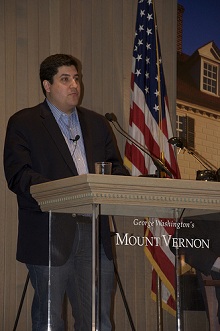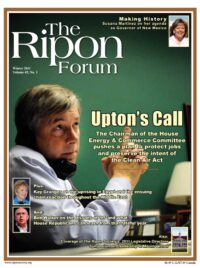 MOUNT VERNON, VA – “Don’t make the mistake of viewing social media as just the communications responsibility.”
MOUNT VERNON, VA – “Don’t make the mistake of viewing social media as just the communications responsibility.”
That was the advice of Matt Lira, the Director of New Media for House Majority Leader Eric Cantor, in remarks at The Ripon Society’s 2011 Legislative Directors Symposium. Lira made his remarks in a panel discussion entitled “A Clever Title is Not Enough.”
The panel focused on the importance of effective legislative communications. In addition to Lira, the panel featured: former Pentagon spokeswoman Torie Clark; former House Leadership press secretary John Feehery; and Dan Mattoon, the former Deputy Chairman of the National Republican Congressional Committee.
In his remarks, Lira compared the power of the Internet today with the power of television 60 years ago, and stated that social media should be thought of in equally revolutionary terms.
“If you go back and look at the early 1950s and mid 1950s,” he said, “if you go and watch the hearings that took place, the really forward-thinking hearings were integrating television as a part of those hearing processes and impacting the political debate nationally as a result. The same opportunity exists today through the use of social media in our legislative business. And so I think there are two main ways in which that can be done.
“As a result of bringing the public in at the beginning and allowing them to engage in that process, we built an audience of people who feel a sense of ownership over the legislative outcome…”
“The first is in the building of public stakeholders. As you are planning out your agenda, introduce opportunities to create stakeholders at the grassroots level in your districts. There are several ways to do that. One that we have done out of the Leader’s office is the You Cut program. We allowed the public to vote substantively in the legislative process. So the outcome isn’t a press release or a survey results page. The outcome is an actual legislative outcome. As a result of bringing the public in at the beginning and allowing them to engage in that process, we built an audience of people who feel a sense of ownership over the legislative outcome and care that a bill is passed.
“If there is one thing that we know, it’s that there is so much work that happens day-to-day on the committees and on the floor that the public is not aware of. So the great opportunity of social media is that you can tie niche audiences that do care about the legislative outcome to the ownership — give them a sense of ownership over the process, so they care when the bill passes and they celebrate it. If the Senate stops it, they care about that, too. If it makes it all the way to the White House and is vetoed, they care about that. If it is signed, the public knows that from day one your office was the one championing that, and of course that trickles up to the member as a sense of accomplishment.
“A second way I think that you can utilize social media is in crowd-sourcing some of the workload that you have in the office. It’s no secret to any LD in this room that the workload that you have is probably higher than it’s ever been for any congressional office in terms of researching and getting the facts — whether it’s questions for a hearing or research for legislation. So in addition to the great resources that you have around the broader, traditional community, you have I think the opportunity to crowd source some research for your legislative programs.
“…we asked people on our e-mail list essentially to go through an Excel spreadsheet and look for programs that they thought were wasteful at the National Science Foundation. Within 24 hours, we had 10,000 responses.”
“It was admittedly an experiment and we didn’t promote it at all — we were just trying to see if it would work – but we did what we would call a citizen review, where we asked people on our e-mail list essentially to go through an Excel spreadsheet and look for programs that they thought were wasteful at the National Science Foundation. Within 24 hours, we had 10,000 responses. People may have spent 10 minutes or an hour going through it, but the responses were valid. Hopefully, it will lead to legislative outcomes in the 112th Congress directly built on the foundation of research that, frankly, we could not have done in our office because it would have taken one staffer months to go through thousands of line item spending requests from the National Science Foundation.
“So as you’re building you’re legislative agenda, really think about, ‘Is there an opportunity to involve local stakeholders in the process through the website in a substantive way in legislation?’ Not just driving the message, although that is a critical part of it. But actually, how can they help me do my job better as a legislative director for my member of Congress?
“As you experiment with that and achieve successes, please let me know, because I love to champion that to anyone I can. If we successfully achieve that, it will help build a stronger foundation for our majority — hopefully for a long, long time.”




